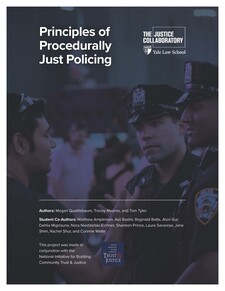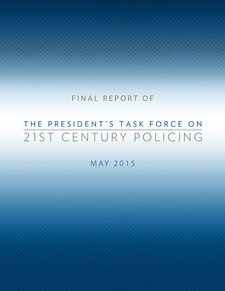Moving Criminal Justice Authorities Towards Evidence-Based Practices
- Law Enforcement Training Material and Guides
- Procedural Justice and the Courts
- Procedural Justice for Prosecutors
1. Law Enforcement Training Materials and Guides
- The National Initiative for Building Community Trust & Justice (2017, 2018)
- Final Report of the President’s Task Force on 21st Century Policing (2015)
- Police Executive Research Forum (2014)
The National Initiative for Building Community Trust & Justice (2017, 2018)
As part of the National Initiative for Building Community Trust & Justice, the Justice Collaboratory in partnership with the Center for Policing Equity and the Chicago Police Department’s Education and Training Division has developed a three-day procedural justice training module for law enforcement that addresses the theory and implementation of procedural justice as well as the role implicit bias plays in police-community interactions.
The training was divided in three modules and adapted to the unique history and police practices of six pilot sites: Birmingham, Alabama; Fort Worth, Texas; Gary, Indiana; Minneapolis, Minnesota; Pittsburgh, Pennsylvania; and Stockton, California. Each pilot site provided training for its sworn officers though not all officers were trained in each module. Pilot Site interim reports are available through the National Initiative for 2017.
Practical Guidelines: “Principles of Procedurally Just Policing” (2018)

National Initiative Pilot Sites Training Snapshot
Birmingham, Alabama Birmingham Officer Perception Survey (PJ1 & PJ2) | Fort Worth, Texas Fort Worth Officer Perception Survey (PJ1) |
Gary, Indiana Gary Officer Perception Survey (PJ1) | Minneapolis, Minnesota Minneapolis Officer Perception Survey (PJ1) |
Pittsburgh, Pennsylvania Pittsburgh Officer Perception Survey (PJ1) | Stockton, California NI 2017 Interim Report |
Procedural Justice Training Modules
- Procedural Justice 1 (PJ1): Introduction to procedural justice theory and concepts
- Procedural Justice 2 (PJ2): Incorporating procedural justice into police practices
- Procedural Justice 3 (PJ3): Implicit bias training for law enforcement
- Procedural Justice 3 Community (PJ3 Community): Community-facing implicit bias training
Select National Initiative Evaluations and Reports
- National Initiative Procedural Justice Resources Page
- “Model Policies for Procedurally Just Policing,” The Justice Collaboratory at Yale Law School
- “Research Roundtable Report,” National Initiative for Building Community Trust and Justice
- “How Do People in High-Crime, Low-Income Communities View the Police?” Urban Institute, pilot sites baseline community perceptions survey
Other Research and Reports on Implementing Procedural Justice for Law Enforcement
- “Training Police for Procedural Justice,” Wes Skogan, et al., Journal of Experimental Criminology
- “Identity Traps: how to think about race and policing,” Phil Atiba Goff, Behavioral Science and Policy
- “Review of National Best Practices,” Los Angeles Police Commission
- “Procedural Justice for Law Enforcement,” Laura Kunard and Charlene Moe
Procedural Justice Trainers
The trainers included on this list provide procedural justice training that is germane to the curriculum initially developed by the Justice Collaboratory, the Center for Policing Equity and the Chicago Police Department for the National Initiative.
| Al Ferreira Police Officer and Trainer Chicago Police Department Cell: 708-715-4839 cpd022@msn.com | Angel Novalez Sergeant Chicago Police Department Cell: 773-844-2104 | Dan Goetz Police Officer Chicago Police Department Cell: 708-932-4741 |
| Mike Chatham Police Officer Chicago Police Department Cell: 773-573-7522 | Scott Meadors Scott Meadors and Associates LLC Cell: 916-337-5447 smeadors4@gmail.com |
Final Report of the President’s Task Force on 21st Century Policing (2015)

In 2014, Tracey Meares, Walton Hale Hamilton Professor of Law at Yale Law School and one of the founding directors of the Justice Collaboratory was appointed by President Barak Obama to serve on the President’s Task Force on 21st Century Policing.
The Final Report of the President’s Task Force on 21st Century Policing, released in May of provides U.S. law enforcement agencies with guiding principles and recommendations to help reduce crime while building public trust within the communities they serve. Recommendations focus on technology, procedural justice, crime reduction, community police relationships, officer safety, and training.
Police Executive Research Forum (2014)
This report argues that legitimacy and procedural justice are essential elements of leadership in policing. It traces the development of the concepts of legitimacy and procedural justice and examines why people do (or do not) obey the law and respect institutions of authority. It discusses the importance of community trust; the dependence on legitimacy for the success of policing; increasing legitimacy as an element of leadership in policing; the importance of “internal” legitimacy and procedural justice; legitimacy and procedural justice as a criterion by which police departments are judged; legitimacy as a concept that police executives should integrate into their thinking about everything that a police department does; and how police can build legitimacy, sometimes without changing their basic approach to managing issues.
Police Executive Research Forum. (2014). Legitimacy and procedural justice: A new element of police leadership. Washington, DC
2. Procedural Justice and the Courts
For resources on procedural justice and the courts, visit the Procedural Fairness for Judges and Courts website.
In " Procedural Justice: Practical Tips for Courts”, Emily Gold LaGratta highlights communication strategies that can be used to promote perceptions of fairness in the court context. This resource was developed as part of a multi-year collaboration involving the Center for Court Innovation, National Judicial College, and the U.S. Department of Justice’s Bureau of Justice Assistance, with guidance from a national advisory board.
3. Procedural Justice for Prosecutors
Procedural Justice for Prosecutors is a curriculum developed through a partnership between the Center for Court Innovation and the Institute for Innovation in Prosecution at John Jay College in New York City. These materials respond to the growing recognition among prosecutors that bolstering public confidence in justice is an essential ingredient of reform. The goal of the curriculum is to assist District Attorney’s interested in beginning conversations about fairness, legitimacy, equity, and better interactions between line prosecutors and witnesses, defendants, and members of the public.